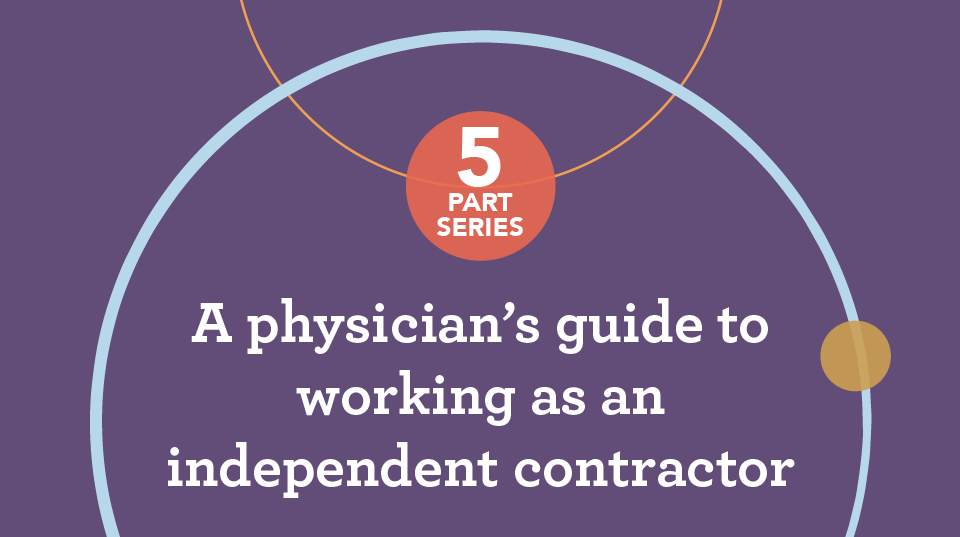 When physicians work locum tenens assignments, they typically do so as independent contractors. Assignments can be the occasional weekend gig or a long-term opportunity — some assignments can last months or even years! While some physicians like to travel and enjoy visiting new places for an assignment, others work locum tenens within a few hours of home. Even working abroad in places like New Zealand or Canada is a possibility. Here are four key takeaways for physicians about working as an independent contractor.
When physicians work locum tenens assignments, they typically do so as independent contractors. Assignments can be the occasional weekend gig or a long-term opportunity — some assignments can last months or even years! While some physicians like to travel and enjoy visiting new places for an assignment, others work locum tenens within a few hours of home. Even working abroad in places like New Zealand or Canada is a possibility. Here are four key takeaways for physicians about working as an independent contractor.
1. Work with a locum tenens agency
Most physicians who work locum tenens do so through an agency that can assist them with travel, housing, credentialing, pay rate negotiation, and more. An agency will also match you with a recruiter who’ll get to know you and will find assignments that meet your needs and preferences.
Dr. McKayla Sakimura, an emergency medicine physician, says her CompHealth recruiter acts as an advocate for her. “My recruiter isn’t just my recruiter. He’s my overall representative. I feel like any question I have I can go through him.”
There are many locum tenens agencies, so it’s important to choose wisely. Start by verifying if the agency you’ve chosen is a member of the National Association of Locum Tenens Organizations (NALTO), which maintains industry standards for its members. It’s also a good idea to solicit recommendations from colleagues or ask to speak with physicians who’ve previously worked with an agency you’re considering.
Once you’ve chosen an agency, be discerning when selecting an assignment. Make sure you understand what’s expected of you regarding schedule, patient volume, and call expectations and that your skill set matches what the facility is looking for.
2. Voice your preferences so you get what you expect
Once you’ve chosen an assignment, the next step is to finalize logistics. In most cases, your locums agency will do most of the heavy lifting when it comes to travel and housing reservations, though it’s important to voice your preferences to ensure you get what you’re expecting.
If your assignment is nearby, you may be reimbursed for mileage costs. If it’s further away, the agency will coordinate your air travel and a rental car. For lodging, shorter assignments usually involve a hotel stay, while longer assignments could include an extended-stay hotel suite or a rental unit. If you want to travel with family members or a pet, indicate this to your recruiter.
Your locums agency will also assist with any licensing or credentialing needs you may have, and typically they will coordinate with the facility to streamline paperwork. To ensure everything is ready for you to begin your assignment, make sure to submit any requested documents or information promptly.
3. Ask how locums pay, malpractice, and taxes work
Every locum tenens agency does things a little differently, so make sure you ask upfront about how pay, malpractice, and tax reporting work.
Locum tenens physicians typically receive pay through their locums agency, not the facility where they are working. Payment methods can vary, but many agencies pay on a weekly or bi-weekly basis via direct deposit. You’ll negotiate your pay rate — typically an hourly or daily rate — before agreeing to any assignment. Your locum tenens pay is yours — the agency won’t take a cut of your paycheck; they get paid directly by the healthcare facility. Additionally, you won’t be required to sign an exclusivity contract so that you can work with more than one agency.
However, as locums are considered independent contractors, they do not receive benefits with their wages. Locum physicians need to coordinate things like health insurance and retirement deposits on their own, though there are many different options for them to do so. That said, in most cases, malpractice insurance is covered by the locum tenens agency. Coverage can vary, so it’s important to learn the details of the malpractice coverage being offered by the agency you choose to work with.
Taxes can be complicated, especially if you’ve worked in more than one state, and it’s recommended you work with a tax advisor to ensure you’re filing everything correctly. As a 1099 independent contractor, you’ll be required to pay estimated taxes quarterly. The locums agency can help you with income reporting, but you will typically be required to set aside funds for taxes since agencies don’t do tax withholding for independent contractors.
Some physicians create a business or tax entity, like an LLC or an S Corp, to take advantage of various liability and tax rules. Dr. Jim Mock, an emergency medicine physician, says he enjoys tax advantages through his S Corp by paying himself a monthly base salary and doing a shareholder distribution if he exceeds his base salary.
4. Build a schedule that suits your lifestyle
Locum tenens is a highly flexible career choice for physicians, with a variety of options depending on your wants, needs, and career stage. Some physicians work locums full time, while others work locum tenens part time in addition to their full-time practice.
In many cases, locum tenens can be a great way to earn income while in between jobs or while trying to figure out your next career move. It can also be a good way to continue practicing medicine in a more relaxed atmosphere to ease into retirement.
For those who use locum tenens to visit new places, there are even opportunities to work locum tenens internationally. These assignments vary in length — from as little as two weeks to a one-year commitment — and can take a lot of upfront planning. However, for those who want to experience a different culture while continuing to practice medicine, it’s worth the effort.
Dr. Jason Lambrese, who specializes in child/adolescent psychiatry, worked in New Zealand right out of residency with Global Medical Staffing. He says, “I love that I didn’t have to work the weekends and could travel. I had the freedom to adventure and to explore a lot more than I give myself time to do here in the U.S.”
How to learn more
If you want to learn more about becoming an independent physician contractor, check out CompHealth’s in-depth, five-part series, A physician’s guide to working as an independent contractor.



